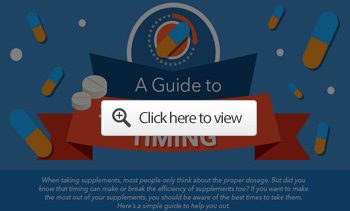When Is the Best Time to Take Your Supplements?
Taking supplements at the right time of day, with or without food, boosts their absorption and effectiveness, letting you get the most out of your supplement routine.
STORY AT-A-GLANCE
When using supplements, choosing the right ones for your need is only a part of the equation — taking them at the right time, with or without food, is also essential to maximize their effectiveness
Water-soluble vitamins are best taken with food during daytime, while fat-soluble vitamins need to be taken with meals containing healthy fats, either in the day or evening
Minerals like calcium, magnesium and zinc also have specific timing requirements — calcium works best in divided doses, magnesium before bed and zinc during daytime with food
Fitness supplements, like beta-alanine, beetroot juice and creatine, require specific timing around workouts and meals to maximize their effectiveness for athletic performance and recovery
While supplement timing enhances benefits, a nutritionally balanced diet remains the foundation of your health; whole foods provide the most bioavailable nutrients and reduce the need for supplements
Supplements have become increasingly popular with more people aiming to improve their health and well-being. According to a 2023 survey by the Council for Responsible Nutrition,1 approximately 74% of U.S. adults take dietary supplements, with 55% using them regularly.
Maximizing the benefits of your supplements goes beyond selecting the right ones and taking the correct dose — timing matters, too. Each supplement has unique absorption patterns that influence how well it works in your body.
Some supplements are best taken with meals, while others are more effective on an empty stomach. Certain nutrients work optimally in the morning, some before bed and others are best timed around exercise for optimal performance and recovery. Understanding these considerations enhances the effectiveness of your supplement routine.
Timing Guidelines for Vitamins
Vitamins are divided into two main categories — fat-soluble and water-soluble. Fat-soluble vitamins (A, D, E and K) are stored in your fatty tissues and liver, and need to be taken with dietary fat for effective absorption. Meanwhile, water-soluble vitamins, which include vitamin C and the B-complex group, dissolve in water and are not stored in the body, so daily intake is essential to maintain optimal levels.2 3
Both B vitamins and non-liposomal vitamin C may cause stomach upset if taken on an empty stomach, so it's generally recommended to take these with meals. Vitamin B complex works efficiently when taken with breakfast, promoting metabolic support throughout the day, while vitamin C is best taken after breakfast with a full glass of water to minimize the risk of nausea.4
For niacinamide (vitamin B3), however, I recommend taking small doses of 50 milligrams (mg) three times a day. This dosage has been shown to optimize energy metabolism and boost NAD+ levels, which are foundational for optimal health. You can also take it four times a day if you space them out. Take a dose as soon as you get up, before going to bed and twice evenly spaced between those times.
Vitamin B12 is another exception, as it's best absorbed on an empty stomach unless you're using a sublingual form. However, B12 may interact with various medications, including those for bone loss, cancer, gout, high blood pressure and acid indigestion (such as H2 blockers and proton pump inhibitors), so check for contraindications before regular use.5
For multivitamins that contain both water- and fat-soluble nutrients, try splitting the dose — take half with breakfast and the other half with lunch or dinner. This ensures a steady nutrient supply throughout the day and reduces any chance of nausea, which sometimes occurs when taking a full dose at once. While you may not notice any ill effects if you take it on an empty stomach, taking your multivitamins with food is a safer bet overall.6
Fat-soluble vitamins D3 and K2 are best taken together with your largest meal containing healthy fats, like grass fed butter, ghee or coconut oil, to maximize absorption. As for vitamin E, it's important to avoid any synthetic vitamin E (alpha tocopherol acetate — the acetate indicates that it's synthetic).
Look for "d-alpha tocopherol" on labels. This natural form contains the D isomer, which is what your body absorbs and utilizes effectively. To get the most out of vitamin E, look for a complete complex with all tocopherols and tocotrienols, specifically the beta, gamma and delta types in the D isomer form.
The Ideal Time to Take Mineral Supplements
Minerals are essential for numerous bodily functions, from supporting bone health to boosting immune function. Like vitamins, the timing of mineral intake significantly influences their absorption and effectiveness. Here's a breakdown of the optimal timing for various essential minerals:
Calcium — Vital for bone health, nerve transmission and muscle function, calcium is best taken in divided doses of 500 mg or less, as your body absorbs smaller amounts more efficiently.7 If you're using calcium citrate, you can take it with or without food since it doesn't require stomach acid for absorption.8
Calcium carbonate, a more common form, needs to be taken with food to enhance absorption. Avoid taking calcium with iron or zinc, as they interfere with each other's absorption.9
Magnesium — This mineral is one of the most important minerals to supplement with, as most people are deficient. It supports muscle relaxation, sleep quality and overall cellular function. Since it has a calming effect, it's often recommended to take magnesium in the evening or before bed.10
Consider pairing magnesium with calcium supplements. If you exercise regularly, take your calcium and magnesium supplements in a 1-to-2 ratio with a pre-workout meal. While a 1-to-1 ratio is generally recommended, most people consume far more calcium than magnesium through diet, so many will need two to three times more supplemental magnesium for optimal balance.
Zinc — This mineral is essential for immune health, wound healing and protein synthesis.11 Take this during daytime with food to avoid stomach upset. Avoid taking zinc with a calcium or iron supplement, as they hinder your body's absorption of zinc.12
Iron — Iron is essential for red blood cell synthesis and energy production, especially in children, young adults and those with iron deficiencies. Iron is most effectively absorbed on an empty stomach.13 However, if it causes gastrointestinal discomfort, taking it with a small snack will help.
Avoid taking iron with zinc, high-fiber foods or caffeine, as they inhibit iron absorption.14 Keep in mind that most men and menopausal women already have excessive iron levels and should not supplement further, to avoid harm from iron overload.
Iodine — Iodine plays a key role in thyroid function and metabolism.15 Although often included in multivitamins, iodine may be taken separately in the evening with food. Avoid combining it with other thyroid medications, as iodine intake needs to be carefully balanced to avoid disrupting thyroid function.
Exposure to halides like chlorine, fluorine and bromine also affects iodine uptake by the thyroid gland, so it's important to avoid these exposures as well.
Potassium — This mineral is vital for muscle and nerve function, cardiovascular health and hydration. It's typically obtained through diet, and the only time you'll need supplementation is when your dietary intake is insufficient or if you've lost too much of it due to illness and other factors. When using a potassium supplement, take it after a meal or with food to avoid stomach upset or laxative effects.16
Optimal Timing for Antioxidants and Bioactive Compounds
Incorporating antioxidants, amino acids and other bioactive compounds into your diet provides substantial health benefits. Chlorella, a nutrient-rich algae known for its detoxifying effects, is most effective when taken in two doses — once during the day and once in the evening, both with meals.
Turmeric and its active compound, curcumin, also work best with meals during the day; adding black pepper, which contains piperine, increases curcumin's bioavailability by up to 2,000%.17 Another daytime supplement that's also best taken with food are omega-3 fats from krill oil. Meanwhile, daytime supplements to be taken on an empty stomach include:
Fermented ginseng for enhanced energy and cognitive support18
Grape seed extract for vascular health and cellular protection19
Rhodiola, an adaptogenic herb that lowers stress levels and supports mental clarity20
L-arginine to promote cardiovascular health and physical performance21
Eggshell membrane and hyaluronic acid for joint health support22
Supplements that are best taken with food in the evening include astaxanthin. It works best when taken with a fat-containing meal, as this will allow its antioxidant properties to aid your body's nighttime repair and regeneration.23 This timing also applies to fermented mushrooms like reishi and shiitake, as well as fermented garlic, all of which support immune function.24
Ubiquinol (CoQ10), known for supporting energy production and cellular health, and liver health supplements are also ideally taken with dinner to align with your body's natural detoxification cycle, which is most active during sleep.
Conversely, some supplements are most effective without food in the evening. This includes resveratrol, a powerful antioxidant linked to heart health and antiaging,25 as well as eye health supplements containing lutein and zeaxanthin, and apple cider vinegar (ACV), promoting satiety and aiding digestion, setting you up for a refreshed morning.
Collagen is also best taken before bed without food; combining it with vitamin C or MSM (methylsulfonylmethane) further boosts your body's collagen production.
What About Fiber, Enzymes and Probiotics?
The timing of fiber supplements is important to minimize their effects on the absorption of other nutrients. For example, psyllium husk is most effective when taken two hours post-meal with a full glass of water, and at least one hour before or two to four hours after any medications.26 It's also ideal to take fiber supplements several hours from exercise, as it slows down digestion, which causes discomfort during physical activity.
Enzymes like bromelain, papain and trypsin serve as digestive aids, support muscle recovery and reduce inflammation. The timing depends on your goal — either take them with a meal to improve your digestion, or take them on an empty stomach after a workout in the morning or afternoon for muscle recovery or anti-inflammatory effects.
Probiotics establish themselves most effectively in the gut when taken on an empty stomach first thing in the morning. This timing allows the beneficial bacteria to reach the intestines with minimal interference from food, stomach acid or other supplements.
Five Fitness Supplements and When to Take Them
Timing your fitness supplements makes all the difference in increasing strength, supporting recovery and getting the most out of your workout. A study published in the Journal of Exercise Nutrition and Biochemistry27 examined five commonly used performance-enhancing supplements and determined the best times to take each for the biggest payoff:
Beta-alanine — This amino acid acts as a precursor to carnosine, which buffers the muscle's pH levels, delaying the onset of fatigue during high-intensity, short-duration exercise. The study suggests that taking beta-alanine with meals containing carbohydrates and protein enhances its uptake, as insulin helps deliver beta-alanine to muscle tissues.
Taking 3 to 6 grams of this supplement consistently, with meals, over a period of four to 10 weeks is shown to significantly elevate muscle carnosine levels, enhancing performance capacity and delaying fatigue.
Beetroot juice (nitrate) — Nitrate from beetroot juice is converted in the body into nitric oxide, which improves blood flow, reduces the oxygen cost of exercise and enhances performance during aerobic activities. The authors recommended consuming 5 to 9 mmol of beetroot juice about two to 2.5 hours before exercise to allow enough time for your body to process the nitrates.
Caffeine — Known for boosting alertness and delaying fatigue, caffeine is used to improve endurance and focus in both aerobic and anaerobic exercise. The study suggests taking 3 to 6 mg of caffeine 30 to 60 minutes before activity, allowing it to reach peak blood levels just as you begin your workout.
Creatine — Creatine binds to phosphate in the body, creating a compound called creatine phosphate, which is then used to produce adenosine triphosphate (ATP), the energy fuel for your cells.28
While creatine is particularly beneficial for exercise performance, it also plays a role in cognitive health, supporting memory and focus. A study29 showed that creatine is best absorbed after a workout, especially when taken with beverages containing carbohydrates and protein.
According to Harvard Health Publishing,30 the recommended daily dose of creatine is 3 to 5 grams. There's no advantage to taking high doses, as it will only strain your kidneys. Taking 10 grams per day causes gastrointestinal discomfort and diarrhea, while 20 grams daily leads to water retention. To avoid these side effects, it's best to stay within the recommended dose.
Sodium bicarbonate — As an alkaline compound, sodium bicarbonate counteracts the acid buildup in muscles during high-intensity activities, delaying fatigue and enhancing performance.
For best results, the authors recommended taking sodium bicarbonate 60 to 180 minutes before exercise at a dose of 300 to 500 mg per kilogram of body weight. To reduce the risk of gastrointestinal discomfort, consume it with a carbohydrate-rich meal.
Prioritize Adopting a Nutritious Diet — The Foundation of Your Health
While precise timing enhances the benefits of supplements, the cornerstone of vibrant health is still a well-rounded, nutritionally balanced diet. The better and more wholesome your diet is, the fewer supplements you will need.
The most bioavailable forms of nutrients come from whole foods, where they exist alongside naturally occurring compounds that aid absorption. Supplements work best as supportive allies, but they can't replace the foundation provided by whole foods.
To maintain and enhance your wellness, start by establishing a foundation of nutrient-dense foods, then integrate supplements strategically based on your individual needs. For a concise, easy-to-follow overview of the best timing strategies, check out the infographic below.
Disclaimer: The entire contents of this website are based upon the opinions of Dr. Mercola, unless otherwise noted. Individual articles are based upon the opinions of the respective author, who retains copyright as marked.
The information on this website is not intended to replace a one-on-one relationship with a qualified health care professional and is not intended as medical advice. It is intended as a sharing of knowledge and information from the research and experience of Dr. Mercola and his community. Dr. Mercola encourages you to make your own health care decisions based upon your research and in partnership with a qualified health care professional. The subscription fee being requested is for access to the articles and information posted on this site, and is not being paid for any individual medical advice.
If you are pregnant, nursing, taking medication, or have a medical condition, consult your health care professional before using products based on this content.








